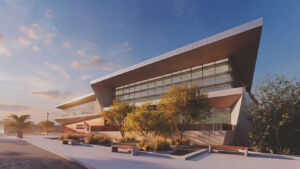In September, e-commerce giant Amazon announced it was looking for a location to build its second North American Headquarters. Dubbed “HQ2,” the project would total eight-million square feet, employ 50,000 workers and cost $5 billion to build and operate.
Many are touting it as the economic development project of the decade, putting pressure on economic developers and city officials across the nation to submit Request for Proposals in hopes o gshot for the project, the state’s economic development groups and developers have plenty of other recent wins to be proud of, including the selling points that make the Arizona market so attractive for continued job creation and capital investment.
According to the Arizona Commerce Authority, Arizona ranks first nationally for projected annual job growth, first nationally for entrepreneurial activity, first nationally for higher education degree opportunities and second nationally for workforce quality and availability.
“That says to an employer that we are an attractive place to live and an attractive place to hire talent,” says Keith Watkins, senior vice president of economic rural development for the ACA.
Since 2013, the ACA reports 200,029 direct, indirect and induced jobs were created in Arizona, generating an economic output of $118.73 billion and $3.03 billion in tax revenue.
The ultimate goal of the ACA, the Greater Phoenix Economic Council and other economic development groups like the Arizona Association of Economic Development — a statewide advocacy group for economic development professionals in Arizona since 1974 — is to improve Arizona’s economy by facilitating job creation through business attraction, expansion and creation.
But, “it takes a village,” says Watkins, an AAED member for 26 years and current board member, but he adds, that collaboration has greatly improved over the years.
“No one person or one economic development group can do this on their own,” he explains. “We each bring our own refined set of talents and disciplines to the equation while working towards the same end goal.”
Whether it’s international companies, technology startups or manufacturing and distribution firms, the common variable behind each successful economic development project, both urban and rural, is a team of professionals working towards that shared goal.
As a result, Arizona became less reliant on the “Five C’s” — cattle, citrus, climate, copper and cotton — over the decades to drive the state’s economy. Instead, it has welcomed the arrival of new high wage industries like aerospace and defense, technology and innovation, advanced manufacturing, biosciences and healthcare.
Technology companies are migrating to Greater Phoenix’s urban cores from more expensive markets like San Francisco to capitalize on the area’s top amenities and growing live-work-play synergy. Meanwhile, advanced manufacturing companies, third party logistic firms, processing and distribution centers are also relocating and expanding across Arizona.
Watkins says, “The key for Arizona is maintaining our quality of life and maintaining our attractive operating environment.”
Phoenix lands international cybersecurity firm HQ
It took a collaborative effort of local, state and federal resources to successfully woo the Swiss-based digital content distributor and security firm, Kudelski Group, into selecting Phoenix for the location of its second international headquarters.
GPEC worked together with SelectUSA, a department under the U.S. Department of Commerce created to showcase the United States as the world’s premier business location and to provide easy access to federal-level programs and services related to business investment, the Arizona Commerce Authority and the City of Phoenix to attract the Kudelski Group to the region.
Then it was Greater Phoenix’s business-friendly environment, proximity to other technology hubs, developed infrastructure and access to highly skilled professionals that influenced the Group’s decision.
The Group’s new Phoenix site occupies 30,000 square-feet at 40th Street and Camelback Road with future plans to expand. Over the long term, the Kudelski Group plans to hire 200 to 350 high wage positions in the region, with a focus on driving sustainable growth and developing corporate support functions.
“The Kudelski Group’s investment in Arizona is further evidence that we are transforming and creating a business environment in this state where companies want to move, expand and thrive,” Governor Doug Ducey said. “A decision like this – to create a headquarters location and hundreds of high wage jobs – signals to businesses everywhere that Arizona offers the perfect platform for growth and success.”
Caterpillar digs into Southern Arizona with expanded presence
In an effort to get closer to its customers and boost collaboration across all aspects of the business, Illinois-based construction and mining equipment manufacturer Caterpillar Inc. selected Downtown Tucson as the new location for its surface mining and technology offices.
David Welsh, chief operating office for Sun Corridor Inc., says Caterpillar picked Downtown Tucson because of its close proximity to the talent pool at the University of Arizona, and the recent revitalization of downtown with the arrival of the streetcar, new amenities, restaurants and other live-work-play components.
Located in the Mercado District in Downtown Tucson, the new $43 million, 150,000 square-foot Tucson Mining Center facility is expected to create more than 600 new jobs over five-years, offering positions in management, engineering, product development and support positions. It is scheduled to open in early 2019 and estimated to have an economic impact of $600 million.
“It’s hard to overstate what an infusion of that economic energy does to a place like downtown,” Welsh explains. “This garners a whole new level of interest that we just didn’t get before, which will play out across the whole downtown, region and state for decades to come.”
For instance, since Caterpillar’s announcement, three of its clients have relocated to Downtown Tucson, which includes Hexagon Mining and two other contract engineering firms. There’s even a high-end movie theatre in talks for a Downtown Tucson location so it can tap into the area’s growing workforce.
Eight years ago, Welsh says, he couldn’t give property away in downtown. Now he expects a lot more build-to-suits in Downtown Tucson because most of the vacancies from the Great Recession have been occupied, “which is a good problem to have,” he adds.
America’s largest food redistributor comes to Arizona
In rural Arizona, Illinois-based Dot Foods, the nation’s first and largest food industry redistributor, picked Bullhead City as the location for its new Southwest distribution center, which will create 125 new Arizona jobs over a three-year period.
Dot Foods plans to invest more than $45 million in infrastructure and various equipment for the new Mohave County distribution center, which opened late this year and totals over 162,980 square feet, including offices, dry, refrigerated and frozen warehouse space, a truck yard and garage to service Dot’s fleet.
Dot Food’s selection of Arizona for a new distribution center speaks volumes about Arizona’s strategic geographic location and excellent transportation infrastructure.
In fact, Arizona is the only state in the nation within a day’s drive to three of the world’s largest economies – No. 8 California, No. 12 Texas and No. 15 Mexico, respectively.
Teamwork drives Lucid Motors’ electric car manufacturing plant to Arizona
California-based Lucid Motors picked Casa Grande as the site for its luxury electric car manufacturing facility that’s projected to bring more than 2,000 new jobs and more than $700 million in capital investment to the region by 2022.
Following an extensive search across 13 states and 60 sites, Lucid Motors selected Arizona based on numerous positive factors including business climate, infrastructure, talent, geographic location and the automotive supply chain in the Arizona-Sonora Megaregion, explains Tim Kanavel, Pinal County economic development director.
But the biggest factor, he says, was the highly collaborative relationship exhibited between Lucid Motors, Gov. Ducey’s office, Arizona Senators John McCain and Jeff Flake, the ACA, Pinal County and the City of Casa Grande to help this deal come to fruition.
“The notoriety and international publicity of landing such a high-end luxury electric car manufacturing plant has had a ripple effect on Pinal County,” Kanavel explains. “We have over $20 billion worth of potential projects that we are working on right now.”
No, he doesn’t expect to win all of those projects, but he is proud of a few like the planned $1.1 billion, 2,360-acre motorsports park called Attesa, the proposed $4 billion theme park to be known as Dreamport Villages as well as a $10 billion Resolution Copper Mining project in Superior.
Despite Pinal County being historically known for its mining and agriculture industries, its racing to make a name for itself as an automotive hub.
Benchmark Electronics consolidate, relocate corporate HQ to Arizona
In April, Gov. Ducey and Benchmark Electronics, a global engineering, design and integrated electronics manufacturing company, announced it would relocate its corporate headquarters from Angleton, Texas to Tempe in Arizona.
Benchmark designs and manufactures an impressive variety of advanced technologies, supporting the aerospace, defense, medical, industrial, telecommunications and computing industries.
Watkins says, the skilled talent pipeline, pro-business climate, and high quality of life made Arizona Benchmark’s location of choice. Additionally, Arizona ranks first in the nation for aerospace manufacturing jobs and attractiveness, according to the ACA, and one of the “top seven cities competing with Silicon Valley for tech entrepreneurship,” according to entrepreneur.com.
The move helps position the future growth of Benchmark by allowing it to consolidate corporate headquarters staff in a single location, expand its engineering capability through a partnership with Arizona State University, position itself closer to Arizona’s growing aerospace and defense customers, and serve as a foundation to expand its existing precision technology business.
The relocation is anticipated to create more than 500 jobs over the next five years, which started in May 2017.





